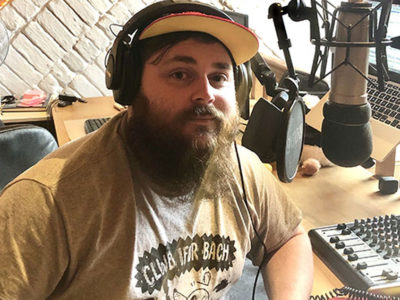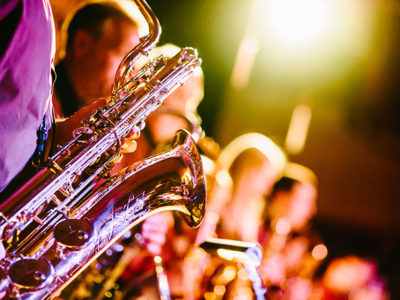What sparked your interest in music?
I was always drawn to music from a very young age. One of my first memories is listening to music in the car with my parents. I started learning the Violin and piano at the age of seven and started song writing once I got my first guitar around the age of 10.
What inspires your Welsh language lyrics?
I tend to write lyrics phonetically. If a line or copulate comes to mind and it has a nice flow, or a nice sound, that often triggers the need to write, and the lyrics develop from there.
How do you think Welsh folk is historically linked with the Welsh language?
There is a great history of Welsh folk and poetry. Some traditions and form of song have remained unchanged for Centuries. There was a big folk movement in the 60s where there was a lot of folk protest songs and other fantastic music in the Welsh language.
Now there are many great contemporary folk artists in Wales. The scene is really flourishing at the moment and many artists are now taking Welsh contemporary folk and music all over the world to be celebrated.
How has ‘A oes ‘na le (i oeri gwres fy nghalon)’ been received?
‘A oes ‘na le (i oeri gwres fy nghalon)’ has had a fantastic reaction. Many, many, non-Welsh speakers have really embraced the song and find it something special due to the fact that it’s in Welsh. For someone who’s a non-Welsh speaker to really engage with the song and understand it in an ‘abstract’ manner is an amazing feeling.
What do you think musicians and audiences need to do to keep the Welsh language alive?
They need to use Welsh in modern culture. The fact that young artists and musicians are creating new Music and art in Welsh is giving Welsh a modern cultural context. It’s an amazing thing to see and to be a part of.
Welsh singer Osian Rhys will be playing a free folk gig at Gwdihw on Wednesday 17th October from 8.30.
Osian grew up in North Wales and his acoustic set will feature enchanting folk songs in both English and Welsh.
‘A song is completely different depending on the language it is written or performed in. If an artist paints the same image in watercolour or thick oil paint, it produces different textures and movements.’
However, non-Welsh speakers shouldn’t be put off, as Osian’s haunting lyrics and soothing tone have been well received throughout the UK.
“All languages produce different sounds and so should be appreciated and enjoyed for their beauty. Welsh is certainly a language that flourishes in the form of verse, lyrics and poetry.”
What sparked your interest in music?
I was always drawn to music from a very young age. One of my first memories is listening to music in the car with my parents. I started learning the Violin and piano at the age of seven and started song writing once I got my first guitar around the age of 10.
What inspires your Welsh language lyrics?
I tend to write lyrics phonetically. If a line or copulate comes to mind and it has a nice flow, or a nice sound, that often triggers the need to write, and the lyrics develop from there.
How do you think Welsh folk is historically linked with the Welsh language?
There is a great history of Welsh folk and poetry. Some traditions and form of song have remained unchanged for Centuries. There was a big folk movement in the 60s where there was a lot of folk protest songs and other fantastic music in the Welsh language.
Now there are many great contemporary folk artists in Wales. The scene is really flourishing at the moment and many artists are now taking Welsh contemporary folk and music all over the world to be celebrated.
How has ‘A oes ‘na le (i oeri gwres fy nghalon)’ been received?
‘A oes ‘na le (i oeri gwres fy nghalon)’ has had a fantastic reaction. Many, many, non-Welsh speakers have really embraced the song and find it something special due to the fact that it’s in Welsh. For someone who’s a non-Welsh speaker to really engage with the song and understand it in an ‘abstract’ manner is an amazing feeling.
What do you think musicians and audiences need to do to keep the Welsh language alive?
They need to use Welsh in modern culture. The fact that young artists and musicians are creating new Music and art in Welsh is giving Welsh a modern cultural context. It’s an amazing thing to see and to be a part of.





